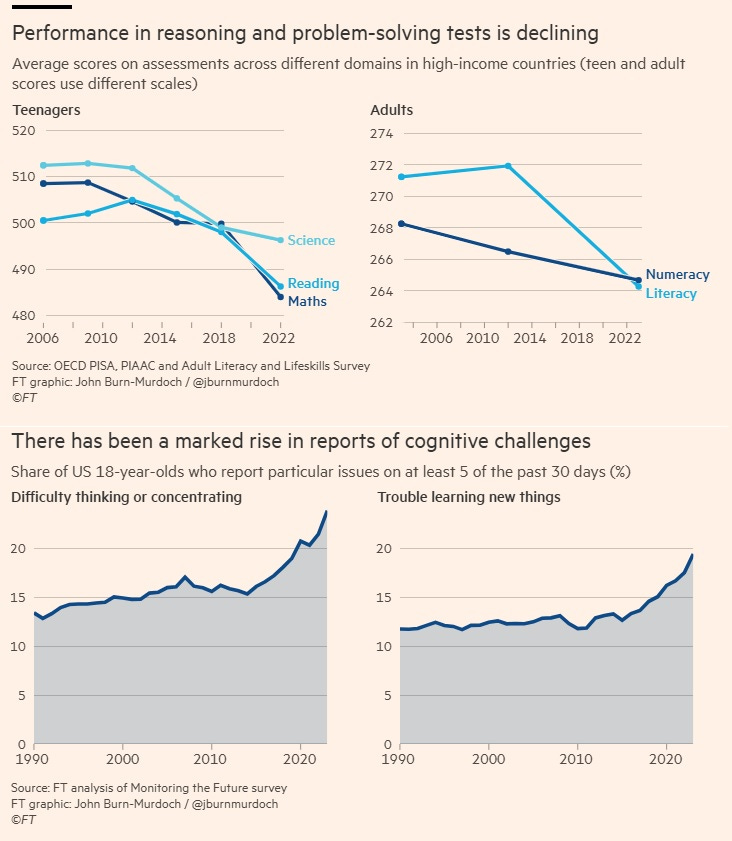My fellow pro-growth Up Wingers,
Are we getting dumber? The data tell a worrying tale: Human cognitive capabilities appear to be in retreat, according to a new analytical piece in the Financial Times by John Burn-Murdoch, “Have humans passed peak brain power?”
Some examples: Since 2012, scores in reasoning and problem-solving have fallen precipitously across benchmark tests in rich countries. The share of 18-year-olds reporting difficulty thinking and concentrating has climbed steadily since the mid-2010s. Most striking perhaps is that 25 percent of adults in high-income countries (and 35 percent in America) now struggle with basic mathematical reasoning.
What has changed is not human biology — don’t blame de-evolution, chemtrails or microplastics! — but behavior, according to the FT. Reading rates have plummeted. Fewer than half of Americans read a book in 2022. Yet this represents merely one facet of a broader phenomenon: The erosion of sustained mental focus. The culprit appears to be our newly passive relationship with information rather than self-directed exploration. Web surfing good. Scrolling bad.
From the piece
We have moved from finite web pages to infinite, constantly refreshed feeds and a constant barrage of notifications. We no longer spend as much time actively browsing the web and interacting with people we know but instead are presented with a torrent of content. This represents a move from self-directed behaviour to passive consumption and constant context-switching. Research finds that active, intentional use of digital technologies is often benign or even beneficial. Whereas the behaviours that have taken off in recent years have been shown to affect everything from our ability to process verbal information, to attention, working memory and self-regulation.
In short, although the fundamental human capacity for intelligence remains intact, its execution is increasingly compromised by our habits.
But there are reasons to be optimistic beyond our brains being basically OK. Indeed, one of my mental short cuts is to approach declarations of “peak” anything with a considerable degree of skepticism.
A classic case: the Peak Oil panic of the late 2000s. Experts prophesied imminent decline in global petroleum output, warning of economic collapse as industrial civilization's lifeblood ebbed away. Alarmist literature proliferated, cementing the narrative of impending crisis. Reality had other ideas, however. Technological breakthroughs in hydraulic fracturing and horizontal drilling tapped previously inaccessible shale reserves, transforming fossil-fuel scarcity into sudden abundance. By the 2010s, America — once considered energy-impoverished — emerged as the world's premier oil producer. People, through market forces, adapted.
Likewise, it wouldn’t surprise me to see society adapt to the phenomenon identified by the FT. That’s the Up Wing case. But how could I possibly think such a thing given that we’re all surrounded by hunched-over people flipping through social media?
Digital Revolt. A rebellion may already be brewing — and not just among parents who now regret giving their pre-16-year-old kids smartphones. Surveys reveal that around half of Gen Z wishes social media platforms didn't exist. Young people are increasingly modifying their digital behaviors, with flip phones making a comeback and "offlining" gaining popularity. Perhaps we are approaching an inflection point where the pursuit of mental clarity and sustained attention could once again become valued social currency.
Cognitive Adaptation. Perhaps what we’re seeing isn’t deterioration but specialization. As calculators once freed mental capacity from arithmetic, today's digital tools allow humans to outsource memory and routine processing, liberating cognitive resources for higher functions. Think, for example, how the modern mind demonstrates remarkable and improving agility in dealing with complex interfaces such as navigating between multiple apps while managing notification. Like markets adjusting to tech disruption, human cognition is simply reallocating resources toward areas of maximum comparative advantage.
AI Elevates Skills. There might be new financial incentives to hone critical thinking and analytical skills, as well as the ability to communicate and collaborate with others. That’s one conclusion you might draw from the new paper “Generative AI Adoption and Higher Order Skills.” Researchers analyzed 7.2 million job postings from 378 US companies (2021-2023), identifying 6,522 AI-related positions by searching for terms like "ChatGPT” and comparing skill requirements:
Our findings reveal that the advertised roles which explicitly rely on GenAI tools such as ChatGPT, Copilot, etc., have 36.7 percent higher requirements for cognitive skills. Further, a difference in-differences analysis shows that the demand for social skills within GenAI roles increases by 5.2 percent post-ChatGPT launch. These emerging findings indicate the presence of a hierarchy of skills in organizations with GenAI adoption associated with roles that rely on cognitive skills and social skills.
Augmented Intelligence. There’s an odd paradox in fretting about "peak brain power" precisely when artificial intelligence is dramatically expanding our collective problem-solving capacity — with more to come. This cognitive augmentation suggests we should perhaps reframe the discussion: What truly matters might not be raw individual performance on standardized tests, but our ability to effectively collaborate with AI tools.
Breakthrough Potential. While the FT piece doesn’t claim a decline in our biological capacity, it’s worth mentioning the possibility of improvement in that area. There’s a Metaculus prediction market that gets at this issue: “By 2050, will genetic engineering techniques be available which can raise IQ by 10 points?” with the consensus giving a more-likely-than-not forecast that some technique (embryo selection, gametogenesis, gene therapy, CRISPR editing) can do the trick.
Heck, there might even be hope for a quick fix to smarten up adults, according to this Manifold question:
Peak brain power? I doubt it.
The Dispatch: For The Silent Majority of Self-Directed Thinkers
Make up your own mind. Read reporting from The Dispatch that tells you the facts, not what to think.
Jonah Goldberg and Steve Hayes launched The Dispatch in 2019 to build an enduring presence on the center-right for original reporting and thoughtful analysis. No insulting clickbait, no false outrage, no annoying auto-play videos—just reliable journalism that prioritizes context, depth, and understanding.
Join half a million loyal readers and start reading The Dispatch today.
Faster, Please! readers: Take 25% off your Dispatch membership today
Micro Reads
▶ Economics
Why rents are out of control - Economist
▶ Business
▶ AI/Digital
Make America Smart Again - WSJ Opinion
A Policy Blueprint for US Investment in AI Talent and Infrastructure - Andreessen Horowitz
▶ Biotech/Health
Young Americans are getting happier - Economist
▶ Clean Energy/Climate
▶ Robotics/AVs
▶ Space/Transportation
▶ Up Wing/Down Wing
▶ Substacks/Newsletters
I See Dead People (part 1 of 2) - Bastiat’s Window
Space Slings - Risk & Progress
OpenAI Wants to Ban DeepSeek - AI Supremacy
Can ‘America First’ Succeed if We Abandon Agricultural Innovation? - Breakthrough Institute
3.5 Trillion GPUs on Mars AI Data Center - next BIG future
Most Externalities are Solved with Technology, Not Coordination - Maximum Progress
The value of technological progress - Works in Progress








Good to read "There's a compelling case for optimism, actually"
"What has changed is not human biology — don’t blame de-evolution, chemtrails or microplastics! — but behavior, according to the FT. "
In the past this information has been suppressed, but now it can be told. Every man, woman, and mutant on this planet shall know the truth about de-evolution!
https://www.youtube.com/watch?v=hRguZr0xCOc